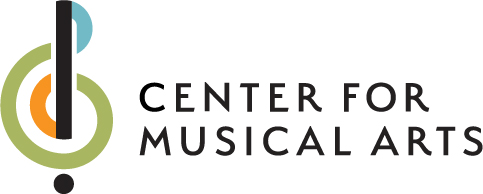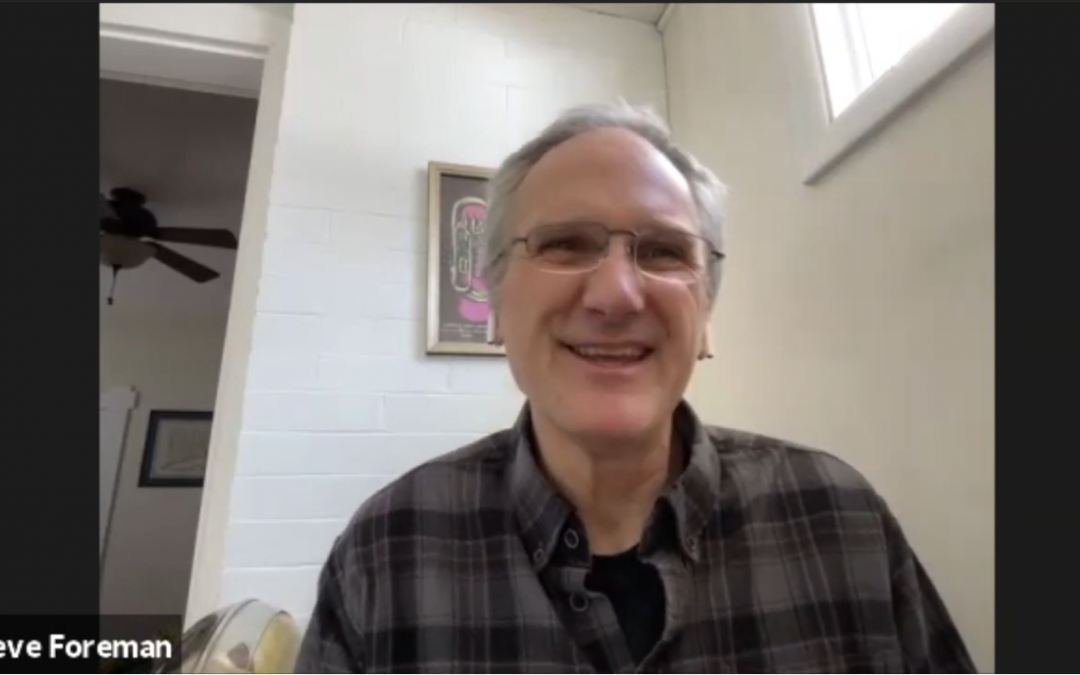The Center for Musical Arts is proud to work with knowledgeable faculty with unique backgrounds. In this interview with low brass (tuba, trombone, euphonium, baritone) instructor Steve Foreman we explore his teaching style, his interests outside of music, and more. Watch or read the interview below.
Center for Musical Arts: Good morning! I’m Erica Reid, I’m the Marketing Manager at the Center for Musical Arts, and we are continuing our project to get to know some of the faculty members at the Center, so today, I am sitting down with Steve Foreman. How are you this morning, Steve?
Steve Foreman: Very well, thank you.
Center: Steve, can you just start us off? I always say, can you give us the lay of the land? What is your history with the Center, and more importantly, what do you teach at the Center?
Steve: Well, I teach low brass at the Center, which includes tuba, euphonium, and trombone. I’ve been teaching, I think, around five years at the Center.
Center: Okay. How would you describe your teaching philosophy? We’re trying to show prospective students the difference between different ways that instructors approach their work, so what is the general feel of one of your classes or your lessons?
Steve: Well, I suppose there’s a through line because I’m the teacher, but it varies from student to student, for sure, and also skill level. I mean, I have true beginners and I have seniors in high school who have been playing for six or seven years, so that makes a big difference.
I really gear toward wherever the student is. Personalities vary quite a bit, too, and learning styles, so it’s kind of — I try to give everyone the same grounding in skills and promote the same love for music that I have and want to instill in my students, but in terms of how to approach them, it would vary depending on each individual student, for sure. And that can change over time as well, as students grow and change and learn as people.
Center: Let’s talk about that love of music for a minute, because one of the things that fascinates me the most is what draws an individual to their instruments. What brought you to low brass in the first place?
Steve: Well, that’s a good question. Tuba is my main instrument, and I started when I was in seventh grade. I think the initial impetus was actually seeing — seeing and hearing — a brass quintet that came to my grade school in sixth grade, and for some reason, I was just attracted to the tuba, the sound of it and the look of it. I hadn’t touched one, but I don’t know, just that big hunk of metal and the sound that it could produce. I was fortunate enough that my band director in seventh grade was also a tuba player, so he became my teacher and a great person and influence and teacher, and so it went from there.
Center: I also like to ask about teachers or mentors who help us along the way because that is so much your role, too, at the Center. Are there other instructors that have helped shape the path that you’ve taken?
Steve: Absolutely, yeah, I would say all the way through. I’ve had several teachers through my career and learning process and they’ve all left a big impression on me, I would say, all great human beings and have their own ways of approaching the instrument and music and life. I don’t know, just the nature of the one-on-one relationship between a teacher and a student when learning music is something that’s very special, I think, and it’s just a very close relationship. I don’t know, I think it goes well beyond music and the actual mechanics of learning an instrument, just in terms of human connection and learning how to be a person in the world.
Center: Yeah. Can you tell me a little bit more about why that one-on-one experience is so important in music?
Steve: Learning a musical instrument is kind of like learning a trade, I guess, in the old sense of the “apprenticeship” kind of system. There’s so much involved in it that having that close example of your teacher is essential. There’s so many different aspects to being a musician and playing a particular instrument that it’s like becoming a blacksmith or a…
In Japan, they have this system down through generations within families of artisans who learn their craft and spend decades at it, so I mean, we necessarily aren’t quite that intensive as that system, but the same principles apply, I think.
Center: Yeah. I think that is a really wonderful analogy to make. It’s certainly a skill that you need to acquire, and I like that idea of the tradesman/apprenticeship, absolutely. When you’re not teaching or listening to music, what else is filling your life these days?
Steve: Well, let’s see. I actually have another job, profession. I’m a farmer as well, an organic farmer.
Center: Really?
Steve: Mm-hmm, so that takes up quite a bit of time. I do also, I have other pursuits. I love hiking with my dog, I love baking, so a lot of things going on, yeah.
Center: Oh, wonderful. I love to hear that. Well, Steve, is there anything else that I haven’t covered here that you think would be important for someone who was interested in studying with you to understand, or somebody who was thinking about looking more into the Center for Musical Arts?
Steve: Hmm. One thing that I wanted to say was that I certainly don’t expect all of my students to go on to become professional musicians. Certainly, that’s a fine goal and some students do go that direction, but just studying an instrument or music in general at the Center is such a valuable thing to do, I think. For engineers, for poets, for anything you could possibly want to do, it just adds so much breadth and value to your life. That’s a great thing to do and there’s certainly no requirement that anyone have that as their goal or sole focus.
Center: I think that is another wonderful note to end on because, yeah, it’s very core to the Center’s belief that music is for everyone and you don’t have to make it your absolute profession in order to get the benefits of it and in order for it to broaden and enrich your life, so I’m really glad that you mentioned that. Well, thank you so much for your time today. I learned a lot and I look forward to talking to you again in the future.
Steve: Thank you.
If you’re a student of any age interested in beginning lessons, visit our Lessons page!

